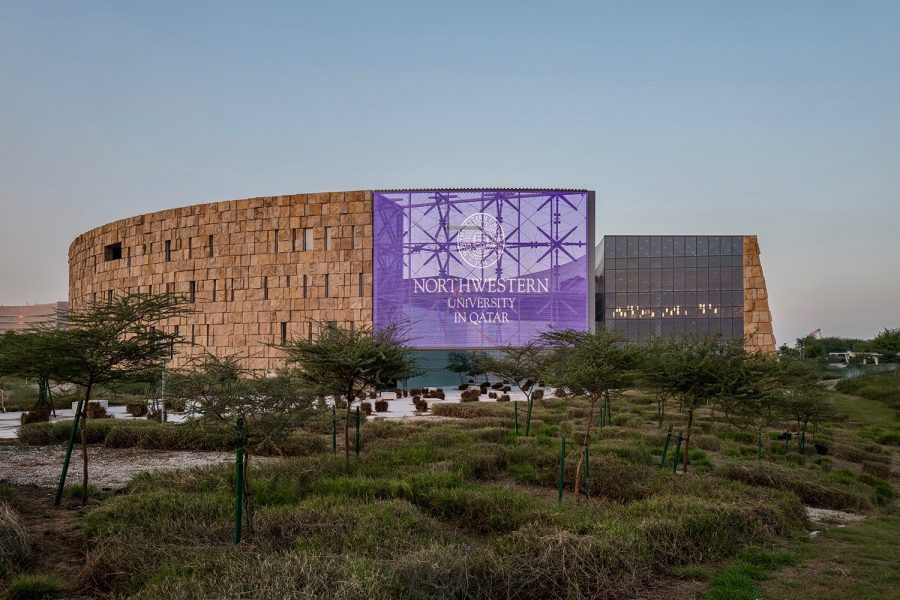NU-Q cancels Lebanese band’s talk after online anti-LGBTQ backlash
Northwestern University in Qatar. The Lebanese indie rock band Mashrou’ Leila’s event on the campus was cancelled over the weekend following anti-LGBTQ backlash.
February 4, 2020
Northwestern University in Qatar canceled an event over the weekend featuring a prominent Lebanese band whose lead singer is openly gay, following online backlash to their appearance.
Members of the indie rock band Mashrou’ Leila were set to take part in a discussion about “media revolutions in the Middle East” at the campus on Tuesday. The group was scheduled to speak as part of a talk entitled “Language and the Rhythm of the Street” hosted by NU-Q’s Media Majlis, a museum that examines and leads discussions on content of media, journalism and communication.
Over the past week, backlash to the band’s Doha event increased on social media as some users began tweeting an Arabic hashtag stating “we refuse Mashrou’ Leila’s discussion,” demanding the band — whose repertoire includes songs addressing homophobia, gender equality and sectarianism — not be allowed to speak.
“This is against our cultural standards and societal norms,” one Twitter account posted.
NU spokesperson Jon Yates said the University and band “mutually agreed” on the decision to cancel the Qatar campus event. The talk is planned to be rescheduled on the Evanston campus.
Yates added that the decision to relocate was made “out of abundance of caution due to several factors, including safety concerns for the band and our community.”
“We hope that event will facilitate a larger discussion around the ideas that drive the band’s art and music,” the statement read, “and about aspects of civil liberties and freedom of expression that are not always open to such discussions in all parts of the world.”
The event’s cancellation in Doha led to a number of NU-Q students and faculty members expressing their disappointment on social media.
Others also began using a separate hashtag roughly translating to “we welcome Mashrou’ Leila” in response.
“Hosting the event in Evanston isn’t the same as hosting it here,” one student tweeted. “A sad day for freedom of speech and the fight for equality. It’s unfortunate that in this day people still choose hate over peace & coexistence.”
In a statement to The Daily, NU-Q Prof. Justin Martin said in a statement to The Daily that the event’s cancellation relayed a negative message to students and the wider community on the Doha campus.
“‘Don’t look to us for the inclusivity Northwestern University says it holds dear,'” Martin said of the message being sent by NU-Q in canceling the event. “‘And don’t look to us to stand up for freedom of expression, either. You need to leave and go to Evanston for that.'”
One Qatari journalist tweeted Friday that they had contacted the Qatar Foundation about the talk and were told that the organization was in contact with NU-Q about stopping it, and that the event contradicted its mission. The organization founded NU-Q in partnership with the University, and also helped bring the other five American universities in Education City to Doha.
The Qatar Foundation did not respond to request for comment.

Hamed Sinno, lead singer of Mashrou’ Leila, performs during the 18th International Enjoy Jazz Festival on Oct. 2, 2016 in Heidelberg, Germany.
Mashrou’ Leila has dealt with homophobic backlash at other events in the past. When concert-goers at one of the band’s 2017 shows in Egypt waved pride flags during their performance, more than 70 were arrested in one of the largest crackdowns on the country’s LGBTQ community in years.
In a separate event this July, Lebanon’s Byblos International Festival canceled a concert by the band following calls from church leaders accusing the group of blasphemy, as well as death threats directed toward members on social media. The festival’s organizers similarly cancelled the performance “to maintain security and stability.”
Members of Mashrou’ Leila did not respond to request for comment and the band has not yet released a statement on the matter.
In 2017, however, after an event with the band in Amman was cancelled, the group’s lead singer Hamed Sinno spoke out about homophobic backlash to the group’s scheduled performance at the time.
“If you go online and gauge what people had a problem with, people were making the most atrocious homophobic remarks,” Sinno told Newsweek after the 2017 performance cancellation in Jordan. “If the government is listening to the people, then the government is acting upon those homophobic remarks. I do think that (homophobia) is also the issue (the government has).”
This story will be updated with additional student comment.
Email: troyclosson2020@u.northwestern.edu
Twitter: @troy_closson



